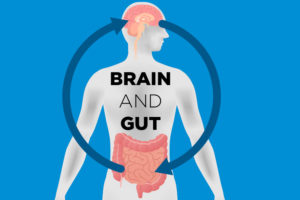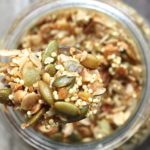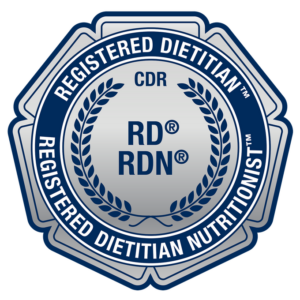Eat your way to better moods with gut healthy foods! Really! If you’ve ever felt an anxious knot in your stomach or felt down in the dumps after a food binge, you’ll really love my latest article.
New research shows us how much our bodies and minds truly are interconnected. If you (or someone you know) suffer from digestive issues such as “IBS,” Crohn’s, colitis, ulcers, or constipation, have you been advised to “de-stress”? What about when you feel anxious or depressed? Have you been advised to eat differently? If not, let me be the first to guide you toward improved gut and mental health. My gift to you this month is how to eat your way to better moods with gut healthy food. Learn all about the gut-brain axis and how you can leverage this new research to improve your gut and brain.
Your Gut is (partially) Controlled by your Brain
 Gut disorders can cause pain, bloating, or other discomfort. They impact over 35 percent of people at some point in life—affecting women more than men. Many times, these gut issues don’t have an apparent or easily diagnosable physical cause, so they can be difficult to treat and find relief from.
Gut disorders can cause pain, bloating, or other discomfort. They impact over 35 percent of people at some point in life—affecting women more than men. Many times, these gut issues don’t have an apparent or easily diagnosable physical cause, so they can be difficult to treat and find relief from.
We already knew that our brains control some of our digestive processes. For example, research has found that even thinking about eating can cause the stomach to release juices to get itself ready for food. This is called the Cephalic phase of digestion. Your gut is also sensitive to emotions. You may recall a time when you felt anxious and nauseous or felt “knots” or “butterflies” in your stomach.
Several studies show that stress may be an important—often overlooked—reason for gut issues. According to Harvard Health, “Stress can trigger and worsen gastrointestinal pain and other symptoms, and vice versa.” Many studies have found that stress reduction techniques can lead to greater improvement in gut symptoms compared to conventional medical treatment alone.
Before we go over how to do this, let’s look at a bit more of the biology behind the gut-brain axis.
Start with the Nervous System
There are two main parts of your “main” nervous system.
- Somatic nervous system – you consciously control, like when we move our muscles to walk around, chew our food, or exercise.
- Autonomic nervous system – The other part of your nervous system controls all of those things that we can’t control, but need to survive. These include processes that happen automatically in the background: breathing, heart beating, sweating. It regulates your body’s functions in 2 ways
- Sympathic part – when things speed up, like “fight or flight” reactions. We feel a sense of danger or stress. The heart beats faster and we breathe heavier. It prepares the body by focusing on getting enough blood and oxygen to our muscles, to work hard.
- Parasympathetic part – when we’re relaxing or calming down. Our heart, lungs, and muscles rest and our digestive systems do their jobs much better. In this phase, we’re secreting more digestive juices to break down food, we’re absorbing more nutrients, and we have lower levels of inflammation in our gut. That’s why this is called the “rest and digest” phase.
Both of these arms of the autonomic nervous system—the sympathetic and parasympathetic—interact with the gut. This means that when our body is stressed we can experience digestive symptoms and when we’re relaxed our digestion does what it’s meant to do.
Your Gut is your “Second Brain”
In addition to your “main” nervous system, your gut has its own nervous system called the enteric nervous system. The enteric nervous system spans from your esophagus, along your stomach, intestines, and colon. This nervous system is sometimes referred to as the “second brain”. It has 100 million nerve cells (called neurons) that communicate with each other using biochemicals called neurotransmitters.
This complex system is important because of how complex our digestive processes are. For example, after we eat, the neurons in our enteric system tell the muscle cells of the stomach and intestines to contract to move food along to the next part.
Your enteric nervous system is also very closely linked to your immune system. This is because a lot of bacteria can enter the body through the mouth and end up in the gut. The cells of the immune system relay information like when they detect an infection or when your stomach is bloated, so your brain knows, too.
Even the friendly gut microbes (gut microbiota) that help us digest and make certain nutrients play a role in communicating with the brain. Which are known to influence our moods.
The Gut-Brain Axis
 This intimate and complex connection between your gut and brain is called the gut-brain axis. And we now know that the signals go in both directions: from your brain down to your gut, and from your gut up to your brain.
This intimate and complex connection between your gut and brain is called the gut-brain axis. And we now know that the signals go in both directions: from your brain down to your gut, and from your gut up to your brain.
This is where we see the link between digestive issues and brain, stress, and mood issues.
When someone is stressed enough that they get into the “fight or flight” reaction, digestion slows right down to allow the muscles to fight or flee. Your body reacts the same whether you’re facing a real life-threatening situation or whether you’re super-stressed. This disruption of the digestive process can cause pain, nausea, or other related issues.
How Stress and Emotions Affect your Gut
Because of these strong connections between the gut and brain, it’s easy to see how stress and other emotions can affect the gut. Things like fear, sadness, anger, or feeling anxious or depressed are often felt in the gut. When they cause our digestive systems to speed up (or slow down) too much, this can influence pain and bloating. It can also allow germs to cross the lining of the gut and get into the bloodstream, activating our immune systems. It can increase inflammation in the gut or even change the microbiota.
 This is why stress and strong emotions can contribute to or worsen a number of gut issues such as Crohn’s disease, colitis, irritable bowel syndrome (IBS), gastroesophageal reflux disease (GERD), or food allergies or sensitivities.
This is why stress and strong emotions can contribute to or worsen a number of gut issues such as Crohn’s disease, colitis, irritable bowel syndrome (IBS), gastroesophageal reflux disease (GERD), or food allergies or sensitivities.
Then, these gut issues are communicated to the brain, increasing the stress response and affecting our moods.
This loop of stress and gut issues and more stress and more gut issues becomes a vicious cycle.
Eat Gut Healthy Foods
What you eat can improve your mood and your gut health. Your gut health improves when you eat a higher-fiber, more plant-based diet. That’s because it provides your friendly gut microbes with their preferred foods so they can grow and thrive. Probiotic foods that include health promoting bacteria are also recommended. Reducing the amount of refined sugar and red meat you eat can also help. They can also lower levels of gut inflammation, as well as reduce the risk of depression and heart disease.
For better gut and mental health, eat more:




- High fiber foods
- Fruits and vegetables
- Whole grains
- Nuts and seeds
- Probiotic rich foods
- Yogurt
- Kefir
- Sauerkraut
- Stress busting foods
- Fatty fish high in Omega 3 fatty acids
- Chickpeas
- Steel cut oats
- Chamomile Tea
- Bloat banishing foods
- Skinless chicken breast
- zucchini
- peppermint
- Cantaloupe
What about stress? Evidence suggests that some stress reduction techniques or psychotherapy may help people who experience gut issues. They can lower the sympathetic “fight or flight” response, enhance the parasympathetic “rest and digest” response, and even reduce inflammation. Some of the stress-reduction techniques I love and recommend are:



- Guided meditation. (Insight Timer or Headspace)
- Box breathing
- Mindfulness and relaxation
- Activity
- Gratitude
- Yoga and Tai Chi
Your gut, brain, and mood will thank you!
Conclusion
Our bodies are complex and interact with other parts on so many different levels. The gut-brain axis is a prime example. Research shows that what we eat improves our mood and gut health. Not to mention that several stress-reduction techniques have been shown to reduce digestive illness as well.
Gut disorders can lead to more complex dietary intolerances, which may require short term elimination plans. These should be done with supervision to ensure you get adequate nutrient balance. Don’t do it alone, seek help from a professional to get to the root cause of gut disorder.
Want to learn how you can eat to improve your mood with gut health foods? Need some deliciously fresh recipes to turn your vegetables into a delicacy your whole family will want to enjoy? Are you looking for a way to incorporate “mood foods” into your daily life? Book a “Get to Know You” call with me to see if my services can help you.
Get to know you call with Laura Cordero
When was the last time someone listened to you? Really listened and provided active feedback. The best way to see if we are a good fit is in a free introductory discovery session.


